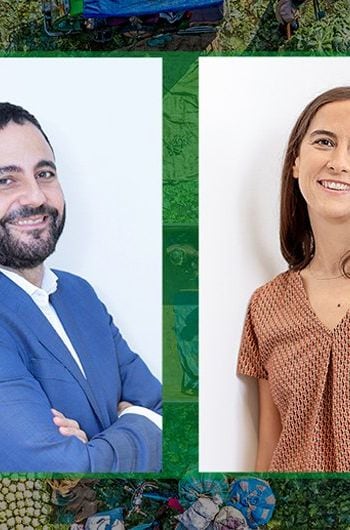Acting for the ecological and energy transition
In the face of the climate crisis, BNP Paribas believes in its responsibility as the European leader in banking and financial services is to redirect its financing towards green projects with the aim of achieving a carbon neutral economy by 2050.
Supporting financing for low carbon energy
The Group has pivoted towards mainly financing low carbon energy: at the end of September 2024, financing for the production of low carbon energy totaled €36.8 billion, of which €34.2 billion was for the production of renewable energy. The Group aims to reach at least €40 billion in credit exposure for the production of low carbon energy, mainly in renewable energies, by 2030.
BNP Paribas no longer provides any financing dedicated to the development of new oil and gas fields regardless of the financing methods. These are two strong markers in the reduction of CO2 emissions, which are supported by BNP Paribas’ numerous actions to help its clients in their transition and promote green innovation.
“In 2015, when the Paris agreement was signed, financing for the production of low-carbon energy only accounted for a limited part of BNP Paribas' financing dedicated to energy production. By 2030, it will represent 90%. The Bank will have then achieved the majority of its transition in less than 15 years, confirming its position as the leader among international financing actors.”
Jean-Laurent Bonnafé, Director and Chief Executive Officer of BNP Paribas
Helping to preserve biodiversity
BNP Paribas is convinced that its role is to support the transformation of its clients’ and partners’ practices, and to act with non-financial actors who advocate for the restoration of nature. As such, the Group has made the choice to further strengthen its commitments in favour of biodiversity, whose erosion presents a major overall risk.
To contribute to the protection of our natural capital, BNP Paribas adopts dedicated policies, participates in coalitions and finances actions with a positive impact. Furthermore, by the end of 2025, BNP Paribas will assess all its corporate clients against biodiversity-related criteria.
Supporting the ecological and energy transitions in 3 key figures
mobilised to support our clients in their transition to a low carbon economy at the end of 2024
in credit exposure for low carbon energy production at the end of September 2024
in financing related to the protection of terrestrial and marine biodiversity at the end of 2024
Reducing energy consumption
BNP Paribas supports all its clients in their transition and offers innovative solutions to help them optimise or reduce their energy needs.
In parallel, the Group is continuing its actions to reduce energy consumption in its own office buildings worldwide.
Designing responsible products and solutions
Citizens and economic actors have expressed a clear desire to actively support projects – particularly through their savings – that contribute to the preservation of the environment or the reduction of social inequalities.
Providing solutions to save and invest responsibly
BNP Paribas, which already invests in impact companies, encourages these actions by offering its clients responsible investments, including green credits and bonds for large companies, as well as funds labelled as sustainable for institutional and retail investors.
The Group has set itself the objective of reaching €300 billion in assets under management of the open funds distributed in Europe by BNP Paribas Asset Management. At the end of 2024, these funds totaled €285 billion, representing 90% of the open funds distributed by BNP Paribas Asset Management in Europe.
Promoting the circular economy from product design
One of the best ways to preserve our ecosystems and save energy is to break out of the traditional linear life cycle of a product – extract raw materials, then manufacture, consume and dispose of the product – to promote the circular economy. By working on usage, sharing, reconditioning or extending a product’s lifespan, the circular economy reduces the consumption of non-renewable resources, waste generation and greenhouse gas emissions.
BNP Paribas offers its corporate clients more responsible solutions, such as managing the lifecycle of a corporate client’s IT fleet with BNP Paribas 3 Step IT, the joint venture formed by BNP Paribas Leasing Solutions and 3 Step IT, while also investing in many circular economy innovations, most notably through the BNP Paribas Solar Impulse Venture Fund.
Participating in the transformation of the financial sector
We finance many business activities, some of which present major environmental, social and governance (ESG) challenges.
Providing expertise to our clients to address climate and social challenges
To best support the transition of its different clients – companies, institutions, individuals – BNP Paribas continues to transform and adapt. BNP Paribas clients benefit from the Group’s many specialised areas of expertise that come together in dedicated networks and working groups. For example, the Low Carbon Transition Group, which is made up of nearly 250 international experts dedicated to helping large companies in their transition to low carbon, and Act for Impact, which supports engaged entrepreneurs.
In addition, the Group’s teams around the world are trained on the issues and solutions inherent to both climate and social challenges in order to upskill our workforce on the topics of sustainable finance and the environmental transition.
Our experts in sustainable finance
Committing to ambitious financing and investment policies
As part of its governance, BNP Paribas has published Group positions and sector policies in several key industries, defining criteria to guide our financing and investments in these sensitive areas.
In line with the United Nations Sustainable Development Goals, the Group contributes alongside its clients to the energy transition, the preservation of biodiversity and the security and protection of the population.
We are implementing our roadmap with conviction and discipline, supporting our clients in their transition and promoting sustainable finance and inclusive financial solutions. This approach has made us a key player in financing the energy transition: in particular, the Group has been recognised as the world leader in sustainable bonds and loans in 2024*. Our company purpose is to serve our clients and the world we live in: to do so, we must strengthen our commitment to a just and inclusive environmental transition.”
Points of view
Follow our experts supporting environmental and social transitions on LInkedIn
Headline News
See more news-
Sustainable finance2024-05-22
BNP Paribas continues to accelerate the financing of low-carbon energies and makes new commitments in its Climate Report 2024
-
Sustainable finance2024-05-06
The Group stepped up its financial inclusion efforts in 2023
-
Sustainable finance2024-03-27
Financing societal innovations: watch a video highlighting BNP Paribas’ commitment via impact bonds
-
Sustainable finance2024-02-09
Energy financing: the transformation of BNP Paribas’ business model is accelerating, as confirmed by several rankings
-
Sustainable finance2024-01-15
Let’s break down clichés about circular economy with specialists from BNP Paribas!











